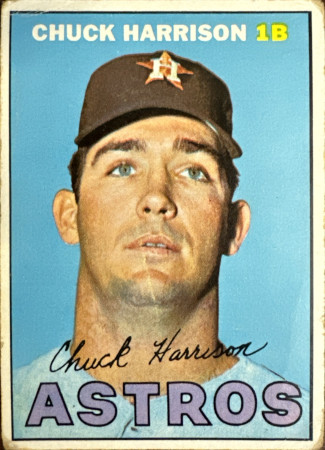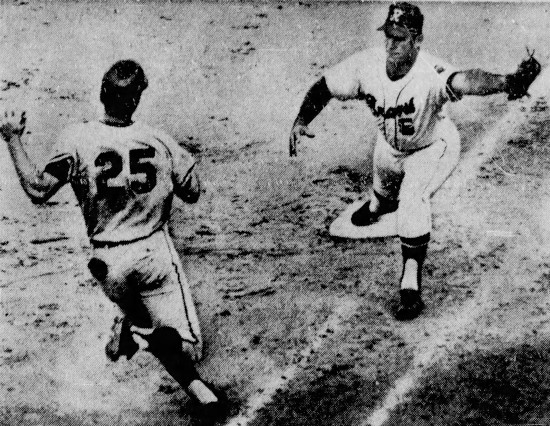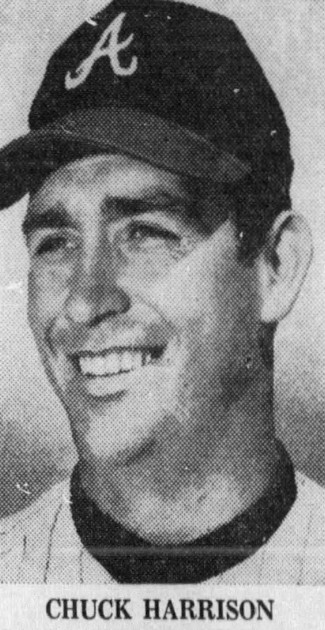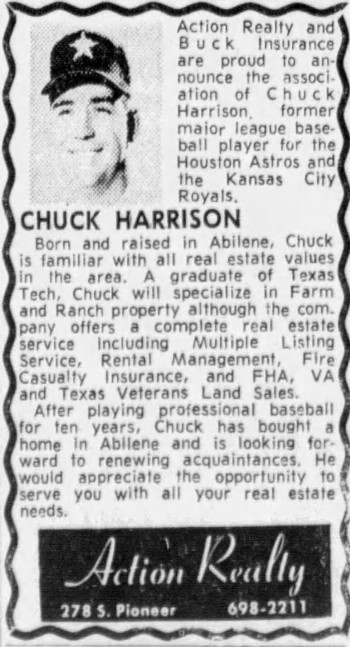RIP to first baseman Chuck Harrison, who played for parts of five seasons in the major leagues during the 1960s and early 1970s. A resident of Abilene, TX, Harrison died on December 30 at the age of 82. He played for the Houston Astros (1965-67) and Kansas City Royals (1969, 1971).
Charles William Harrison was born in Abilene on April 25, 1941. A multi-sport athlete at Abilene High School, he was part of one of the most renowned football teams in Texas history. From 1954 to 1957, the Abilene Eagles won a state record 49 straight games. The team also won three straight state championships and continued a streak of six straight district titles. Harrison, a fullback and linebacker, got to experience the tail-end of that glory as well as the day the streak snapped with a 20-20 tie against Highland Park in 1957. As well as being one of the football team’s top scorers as an upper classman, Harrison was a unanimous pick for the 1959 2-AAAA All-District baseball team as a shortstop.

Harrison married his high school sweetheart, Lorna, and continued to play multiple sports at Texas Tech University in Lubbock. He was a two-time letterman in football, playing both as a fullback and a center. On the baseball squad, he hit .375 for the Red Raiders over his last two seasons while playing third base, shortstop and catcher. Texas Tech football coach J.T. King announced plans to make Harrison a full-time fullback over the summer of 1962, and when the team’s guidebook came out, Harrison was listed as third on the depth chart. Harrison later said that the injuries of playing football were starting to pile up, and he was looking at focusing on baseball full time. As it happened, Houston .45s personnel director Grady Hatton made a contract offer to Harrison, and he opted to sign it and forego his final year of eligibility.
Harrison hoped to make it as a third baseman. “I like it a lot, and I believe I’ll have a good chance to go places at that position with the Colts,” he told the Abilene Reporter-News. He also hoped he could play ball in Texas, but he wasn’t too particular. “I’ll be doing what I’ve always wanted to do and getting paid for it. Heck, I would play whether I got paid or not.”
As it turned out, Harrison spent 1963 splitting time with the Class-A Durham Bulls and Double-A San Antonio Bullets. Between the two teams, he cracked 25 home runs, drove in 79 runs and batted .274. Aside from a pretty disastrous audition at third base with the Bulls, he was used as a full-time first baseman. He spent all of 1964 with the Bullets and led the Texas League with 40 home runs. He also finished with 119 RBIs, one behind league leader Moose Stubing, and he was among the batting leaders with a .298 average. Harrison got off to a slow start in 1965 after being promoted to the Triple-A Oklahoma City 89ers. After some batting adjustments from Hatton, he began slugging homers with regularity and finished with 34. “Chuck doesn’t even know his own strength,” Hatton said. “He pulls everything to left field now. He’ll still look bad now and then. When he realized he’s strong enough to hit all pitches anywhere, he can bust ’em over any fence in the league.”
That September, Houston (now called the Astros) brought Harrison to the majors. He debuted with a pinch-hit walk on September 15, 1965, against San Francisco. On the 17th, he started at first base in Cincinnati and singled off Sammy Ellis for his first career hit. He showed good patience for a rookie, drawing 8 walks in 53 plate appearances. The hits didn’t drop in that often, but his first major-league home run, hit on September 26 off Reds reliever Billy McCool, was a game-winning, 3-run blast that all but scuttled Cincinnati’s hopes of competing with the Giants and Dodgers for the NL pennant. Harrison closed out the season with a .200/.321/.356 slash line, with 9 RBIs.

Houston changed managers in 1966, moving Hatton to the role. He kept Harrison on the team to open the season, but veteran Jim Gentile won the starting first base role. Harrison didn’t hit well coming off the bench and was sent to the minors after a month with a sub-.200 batting average. Gentile later was demoted to Oklahoma City after receiving a 5-game suspension for throwing his bat at an umpire during an argument, and Harrison was recalled to take his place. In his second game as a starting first baseman, he drove in 2 of the team’s 3 runs as Larry Dierker outdueled Dodgers ace Sandy Koufax, 3-0. Harrison batted in the mid .200s and was a fair fielder at first base. He remained in the starting lineup for the rest of the year. He finished with a .256 average, and his 23 doubles were third-best on the team. Harrison hit 9 home runs, which was low compared to his minor-league numbers. However, the Astros as a team didn’t hit many homers in the cavernous Astrodome — Jim Wynn‘s 18 round-trippers were the most on the team.
Syndicated columnist Sandy Padwe noted that of all the Astros players, the native Texan Harrison looked most at home with the Astros. The ballplayer demonstrated his Texas credentials by starting the conversation with Padwe with a discussion of his high school football career. Harrison noted that one of his high school and college teammates, tight end Dave Parks, had just led the NFL in receiving yards with 1,344. “We worked together during the summer around home… it’s mostly cattle and oil country,” he explained. “One year we worked as roustabouts in the oil fields… cleaning drills… carrying pipes… doing everything. Another year we worked on a construction crew… A few years ago, who would have thought Dave Parks would be wearing a San Francisco 49er uniform and Chuck Harrison a Houston Astros uniform?”

Over the offseason, Houston acquired star third baseman Eddie Mathews from Atlanta. Hatton said that Mathews would play at first base to open the season since Harrison was such a slow starter. “I’ll just have to try harder,” Harrison said about the competition. “Actually, I’m glad Mathews is on the team. He’ll help us a lot. I know I’m going to ask him for help with my hitting.” Harrison played at first whenever Mathews rested or was stationed at third base and had a few highlights. On May 23, he drove in 4 runs against the Houston Astros with a par of 2-run doubles as part of an 8-3 win. However, Harrison spent much of his time on the bench or the minors, and when Mathews was dealt to Detroit, rookie Doug Rader was the one who got the bulk of the playing time. Harrison, by his own admission, was another player who was defeated by the Astrodome. “I wound up swinging for singles at home and homers on the road and it really got my hitting messed up,” he said. Harrison played in 70 games for Houston in 1967 and batted .243, with just 2 home runs and 26 RBIs. On October 8, he and shortstop Sonny Jackson were traded to the Atlanta Braves for pitcher Denny Lemaster and shortstop Denis Menke. Harrison played well in Triple-A Richmond in 1968 and belted 25 home runs, including three in a doubleheader against Toledo on June 30. The Braves offense was pretty weak, particularly at first base, but the team didn’t promote Harrison for some reason. Well, Harrison thought he knew the reason. The Braves general manager was Paul Richards, who had been the GM of Houston. He and Harrison didn’t get along, and when Richards was hired by Atlanta, he sent Mathews to Houston, which took away Harrison’s playing time, and then he acquired Harrison and buried him in the minors. Harrison suspected there was a grudge involved, and if so, it makes Paul Richards one of the pettiest people in baseball history. True or not, the Kansas City Royals purchased the first baseman’s contract in October 1968, and Harrison returned to the major leagues.
Having survived the Astrodome, Harrison got to Kansas City’s Municipal Stadium and saw it was 368 feet to left field and 408 to left center. Once again, he was stuck in a field that wasn’t conducive to his right-handed power. So again, he changed his hitting style. “In baseball, you make a lot of adjustments. That’s the game. And one of the adjustments is to the park you play in. There’s no way you can hit the ball over this left field fence with any consistency. It’s just too far,” he told the Kansas City Star in May of 1969. “So I made up my mind to hit line drives here. It’s a big, spread-out park with a lot of room up the alleys. That’s where you have to hit the ball — between the outfielders, not over them.”
The adjustment must have paid off, because Harrison got off to a hot start in 1969. He was 4-for-4 against Detroit on May 6 with a pair of RBIs to raise his batting average to .326, but a dry spell at the plate left his batting average in the low .200s for most of the season. His power also dried up in the big ballpark, as he homered 3 times. The Royals sent Harrison to Triple-A Omaha for 1970, and the stadium there was much more to his liking. He led the team with 21 home runs and batted .279, and he was even better in 1971. He hit .369 with 14 home runs, including 3 on the night he learned he was going back to Kansas City. Harrison drove in 8 runs against Wichita on June 7 and was given a standing ovation when the public address announcer told the crowd that the ballplayer was returning to the majors. “I’ve never been more thrilled,” he said. Once Harrison joined the Royals, he got 8 hits and 7 RBIs in his first 5 games, but he cooled off after that hot start. In 49 games, Harrison batted .217 with 2 home runs and 21 RBIs. In the offseason, Kansas City acquired John Mayberry from Houston, making Harrison expendable. His contract was sold to the Denver Bears, the Triple-A affiliate of the Texas Rangers. He hit just one home run in the thin Denver air and was released at the end of June, marking the end of Harrison’s professional playing career.

Across 5 seasons, Harrison slashed .238/.297/.343. His 241 hits included 43 doubles, 6 triples and 17 home runs, and he drove in 126 runs while scoring 94 times. He drew 85 walks and struck out 147 times. Harrison also slugged 168 home runs in 9 minor-league seasons while batting .277.
Harrison transitioned into real estate once he retired from baseball, working for Action Realty in Abilene. He later became a commodity broker and worked as a truck driver for JB Hunt before retiring. Harrison kept an interest in baseball, though. He could still hit tape measure home runs after leaving baseball, but they were saved for softball and semipro baseball games. He later managed an Abilene semipro team that once won a Texas amateur tournament, and his daughter Cheri was one of the first girls to play Little League baseball in the area. Like her dad, she played first base.
Harrison had a successful post-baseball career in various businesses, but he acknowledged that even if he reached the heights of a new profession, it just wouldn’t be the same as baseball. “It’s like I told my wife,” he said, “once you’ve batted against Sandy Koufax in front of 60,000 fans in Dodger Stadium, everything else is sort of anticlimactic.”
Harrison is survived by his wife, Lorna, and daughters Cheri and Cindy.
For more information: Elmwood Funeral Home & Memorial Park
Follow me on Instagram: @rip_mlb
Follow me on Facebook: ripbaseball
Follow me on Bluesky: @ripmlb
Follow me on Threads: @rip_mlb
Follow me on X: @rip_mlb
Support RIP Baseball



